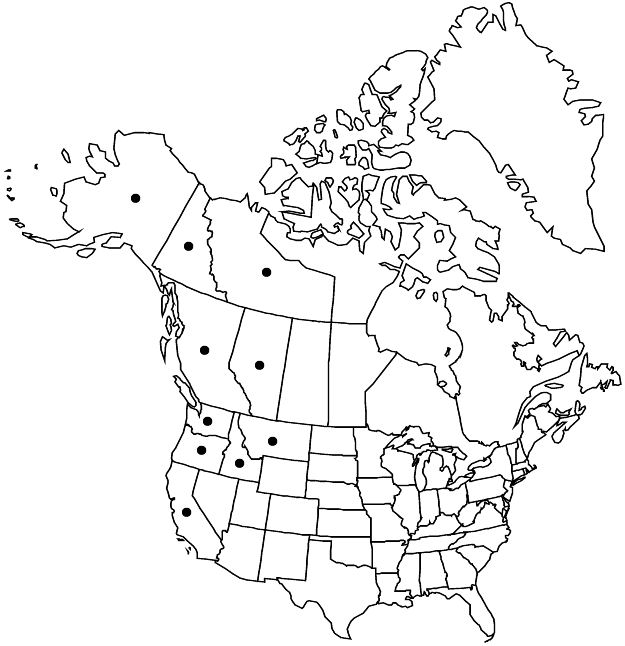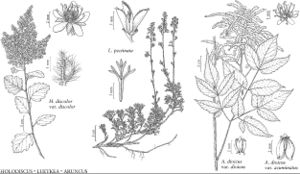Difference between revisions of "Luetkea pectinata"
Revis. Gen. Pl. 1: 217. 1891.
FNA>Volume Importer |
FNA>Volume Importer |
||
| Line 22: | Line 22: | ||
|name=Eriogynia pectinata | |name=Eriogynia pectinata | ||
|authority=(Pursh) Hooker | |authority=(Pursh) Hooker | ||
| − | }}{{Treatment/ID/Synonym | + | }} {{Treatment/ID/Synonym |
|name=Luetkea sibbaldioides | |name=Luetkea sibbaldioides | ||
|authority=Bongard | |authority=Bongard | ||
| − | }}{{Treatment/ID/Synonym | + | }} {{Treatment/ID/Synonym |
|name=Spiraea pectinata | |name=Spiraea pectinata | ||
|authority=(Pursh) Torrey & A. Gray | |authority=(Pursh) Torrey & A. Gray | ||
| Line 43: | Line 43: | ||
|elevation=0–3500 m | |elevation=0–3500 m | ||
|distribution=Alta.;B.C.;N.W.T.;Yukon;Alaska;Calif.;Idaho;Mont.;Oreg.;Wash. | |distribution=Alta.;B.C.;N.W.T.;Yukon;Alaska;Calif.;Idaho;Mont.;Oreg.;Wash. | ||
| − | |discussion=<p>In an ecological study of competition in subalpine meadows in Deer Park, Olympic National Park, Washington, R. del Moral (1983) found that Luetkea pectinata occurred in colder sites, with lower relative drought stress, and moderately low net above-ground productivity (115 and 185 g/m2/yr). Although not focused on L. pectinata, detailed work by del Moral evaluated microsite and microclimatic variation where L. pectinata is able to survive and may be useful in evaluating other sites where L. pectinata forms clonal carpets or where it is a component of a plant association. In contrast to the subalpine studies by del Moral, B. McAvoy (1931) presented a detailed study of plant associations in the Bella Coola Valley, British Columbia, from tidal flats to the alpine zone. She described some of the associations in which L. pectinata occurs, and the range of habitats in which it can occur within a limited geographic region.</p><!-- | + | |discussion=<p>In an ecological study of competition in subalpine meadows in Deer Park, Olympic National Park, Washington, R. del Moral (1983) found that <i>Luetkea pectinata</i> occurred in colder sites, with lower relative drought stress, and moderately low net above-ground productivity (115 and 185 g/m2/yr). Although not focused on <i>L. pectinata</i>, detailed work by del Moral evaluated microsite and microclimatic variation where <i>L. pectinata</i> is able to survive and may be useful in evaluating other sites where <i>L. pectinata</i> forms clonal carpets or where it is a component of a plant association. In contrast to the subalpine studies by del Moral, B. McAvoy (1931) presented a detailed study of plant associations in the Bella Coola Valley, British Columbia, from tidal flats to the alpine zone. She described some of the associations in which <i>L. pectinata</i> occurs, and the range of habitats in which it can occur within a limited geographic region.</p><!-- |
| − | --><p>At higher latitudes (48–65°), Luetkea pectinata ranges from sea level on rocky substrates to open tundra, high elevation alpine tundra, heaths, and other rocky moist habitats with well-drained thin soils. At lower latitudes (40–50°), the southern end of its range, it occurs at or above timberline in mesic to wet forest openings and edges of tree clumps, meadows, heathlands, open rocky slopes and mossy seepage areas, and in subalpine and alpine zones, often forming dense carpets or mats. Plants of L. pectinata appear to be shade intolerant.</p> | + | --><p>At higher latitudes (48–65°), <i>Luetkea pectinata</i> ranges from sea level on rocky substrates to open tundra, high elevation alpine tundra, heaths, and other rocky moist habitats with well-drained thin soils. At lower latitudes (40–50°), the southern end of its range, it occurs at or above timberline in mesic to wet forest openings and edges of tree clumps, meadows, heathlands, open rocky slopes and mossy seepage areas, and in subalpine and alpine zones, often forming dense carpets or mats. Plants of <i>L. pectinata</i> appear to be shade intolerant.</p> |
|tables= | |tables= | ||
|references= | |references= | ||
| Line 68: | Line 68: | ||
|publication year=1891 | |publication year=1891 | ||
|special status=Endemic;Selected by author to be illustrated | |special status=Endemic;Selected by author to be illustrated | ||
| − | |source xml=https://jpend@bitbucket.org/aafc-mbb/fna-data-curation.git/src/ | + | |source xml=https://jpend@bitbucket.org/aafc-mbb/fna-data-curation.git/src/8f726806613d60c220dc4493de13607dd3150896/coarse_grained_fna_xml/V9/V9_711.xml |
|subfamily=Rosaceae subfam. Amygdaloideae | |subfamily=Rosaceae subfam. Amygdaloideae | ||
|tribe=Rosaceae tribe Spiraeeae | |tribe=Rosaceae tribe Spiraeeae | ||
Revision as of 18:18, 18 September 2019
Leaves marcescent; petiole 5–10 mm, narrowly winged; blade green to grayish green, veins abaxially ribbed, adaxially grooved. Flowers: sepals glabrous or sparsely pilose; stamens inserted outside edge of disc. Follicles opening along both sutures, coriaceous. 2n = 18.
Phenology: Flowering Jun–Sep.
Habitat: Rocky substrates, tundra, mesic to wet forest openings, heaths, meadows, seepage areas
Elevation: 0–3500 m
Distribution

Alta., B.C., N.W.T., Yukon, Alaska, Calif., Idaho, Mont., Oreg., Wash.
Discussion
In an ecological study of competition in subalpine meadows in Deer Park, Olympic National Park, Washington, R. del Moral (1983) found that Luetkea pectinata occurred in colder sites, with lower relative drought stress, and moderately low net above-ground productivity (115 and 185 g/m2/yr). Although not focused on L. pectinata, detailed work by del Moral evaluated microsite and microclimatic variation where L. pectinata is able to survive and may be useful in evaluating other sites where L. pectinata forms clonal carpets or where it is a component of a plant association. In contrast to the subalpine studies by del Moral, B. McAvoy (1931) presented a detailed study of plant associations in the Bella Coola Valley, British Columbia, from tidal flats to the alpine zone. She described some of the associations in which L. pectinata occurs, and the range of habitats in which it can occur within a limited geographic region.
At higher latitudes (48–65°), Luetkea pectinata ranges from sea level on rocky substrates to open tundra, high elevation alpine tundra, heaths, and other rocky moist habitats with well-drained thin soils. At lower latitudes (40–50°), the southern end of its range, it occurs at or above timberline in mesic to wet forest openings and edges of tree clumps, meadows, heathlands, open rocky slopes and mossy seepage areas, and in subalpine and alpine zones, often forming dense carpets or mats. Plants of L. pectinata appear to be shade intolerant.
Selected References
None.
